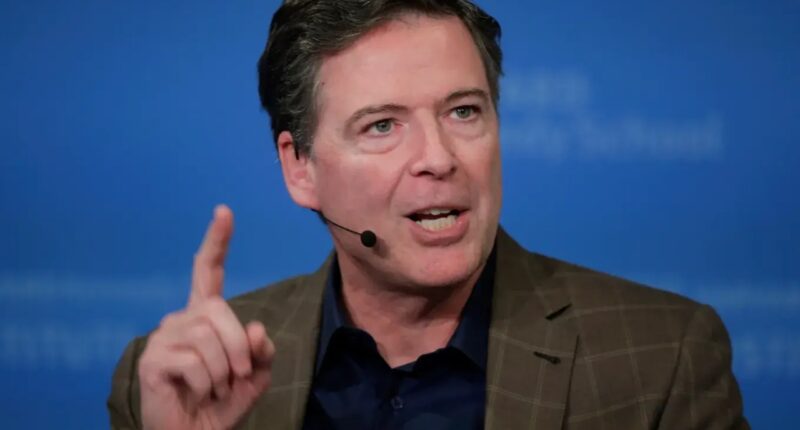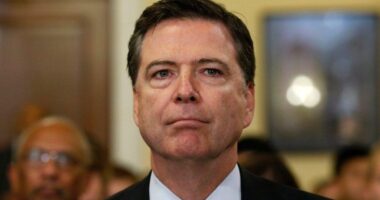In a dramatic escalation of President Donald Trump’s public campaign against his political adversaries, former FBI Director James Comey was indicted on September 25, 2025. The charges, filed by a federal grand jury in Virginia, accuse one of the president’s longest-standing foes of lying to Congress and obstruction of justice. The indictment immediately ignited a political firestorm, drawing sharp criticism from legal experts and Democrats who decry it as a weaponization of the justice system, while being celebrated by Trump and his allies as long-overdue accountability. The case sets the stage for a monumental legal battle that will force a courtroom examination of a bitter chapter from the Trump presidency.
The charges against Comey are narrowly focused on a specific exchange during his testimony before the Senate Judiciary Committee on September 30, 2020. At that hearing, which was conducted remotely via Zoom, Comey was questioned by Senator Ted Cruz (R-Texas) about testimony he had given three years earlier. Back in May 2017, Comey had sworn to Senator Chuck Grassley (R-Iowa) that he had “never” been an anonymous source to the media about the Trump or Clinton investigations, and that he had “never authorized someone else at the FBI” to be such a source.
When Cruz asked Comey in 2020 if he stood by that 2017 testimony, Comey replied, “I can only speak to my testimony. I stand by the testimony you summarized that I gave in May of 2017.” According to the indictment, that simple statement—affirming his past denial—was a lie.
What Prosecutors Claim Happened
The heart of the case rests on the allegation that James Comey did, in fact, authorize someone to act as an anonymous source for the media regarding an FBI investigation. While the indictment is sparse on details, referring only to “PERSON 1” and “PERSON 3,” sources familiar with the case have identified the key figures . “PERSON 1” is believed to be Hillary Clinton, and the investigation in question appears to be related to the Clinton Foundation. The anonymous source Comey allegedly authorized, “PERSON 3,” is identified as Daniel Richman, a law professor and close friend who served as an unpaid special government employee for the FBI during Comey’s tenure.
BOOM 💥
Statute of limitations for lying to Congress is (5) yrs…this clip is from Sept 30th 2020
James Comey will be indicted on federal charges of lying to Congress which carries (5) yrs in prison
He will be indicted just b4 their set to expire.. pic.twitter.com/8qb3DAeYrm
— @Chicago1Ray 🇺🇸 (@Chicago1Ray) September 25, 2025
The prosecution’s claim seems to be that by authorizing Richman to share information with reporters, Comey’s 2020 statement to Congress—that he had not authorized “someone else at the FBI”—was knowingly false. This issue is likely to be a central point of contention, as Richman was not a full-time FBI employee. The indictment does not appear to be about the more widely known memos Comey authored about his conversations with Trump, which he admitted to sharing with Richman after his firing to prompt the appointment of a special counsel.
Instead, it focuses on an earlier leak. The case was rushed to a grand jury this week because the five-year statute of limitations for the charges was set to expire on September 30, 2025.
You Might Like: Dr. Ian Andre Roberts: Des Moines, Iowa, Superintendent
A Case Fraught with Political and Legal Challenges
The path to conviction is far from certain, as the case faces significant legal and practical hurdles. First, the overt political pressure from President Trump is expected to be a major factor in the defense’s strategy. In the days leading up to the indictment, Trump publicly called on Attorney General Pam Bondi to prosecute his enemies, fired the previous U.S. Attorney for the Eastern District of Virginia, Erik Siebert, and replaced him with Lindsey Halligan, his former personal lawyer, who has no prior experience as a prosecutor. James Comey’s attorneys are likely to file a motion to dismiss the charges based on “selective and vindictive prosecution,” arguing the case is the product of a presidential grudge, not neutral law enforcement.
Second, legal experts point to weaknesses in the evidence. The indictment itself is unusually brief and contains no direct quotes from Comey’s testimony, which is a stark contrast to typical perjury cases. Proving a false statement charge requires showing that Comey knew his statement was untrue when he made it, which can be exceptionally difficult. The evidence largely hinges on conflicting accounts between Comey and his former deputy, Andrew McCabe, who was himself fired for lacking candor.
Furthermore, the 2020 hearing was plagued by technical audio issues common in early Zoom hearings, where crosstalk often cut off Comey’s feed, potentially creating ambiguity about what was clearly heard and understood. Even the grand jury expressed skepticism, rejecting a third charge that prosecutors sought against Comey.
🚨 BREAKING: James Comey posts a video statement following his indictment
“My family and I have known for years that there are costs to standing up to Donald Trump, but we couldn’t imagine ourselves living any other way.
We will not live on our knees, and you shouldn’t either.… pic.twitter.com/7oisRjWAfK
— MeidasTouch (@MeidasTouch) September 26, 2025
James Comey has vowed to fight the charges, proclaiming his innocence and welcoming a trial. The case will proceed in a climate of intense political scrutiny, testing the resilience of the judicial system against a backdrop of claims and counterclaims about weaponized justice. As both sides prepare for an October 9 arraignment, the nation watches a real-time drama that pits a president against his former FBI director, with the integrity of the Department of Justice hanging in the balance.









